This post is also available in:
 Italiano (Italian)
Italiano (Italian)
30 SEPTEMBER
4 OCTOBER 2025
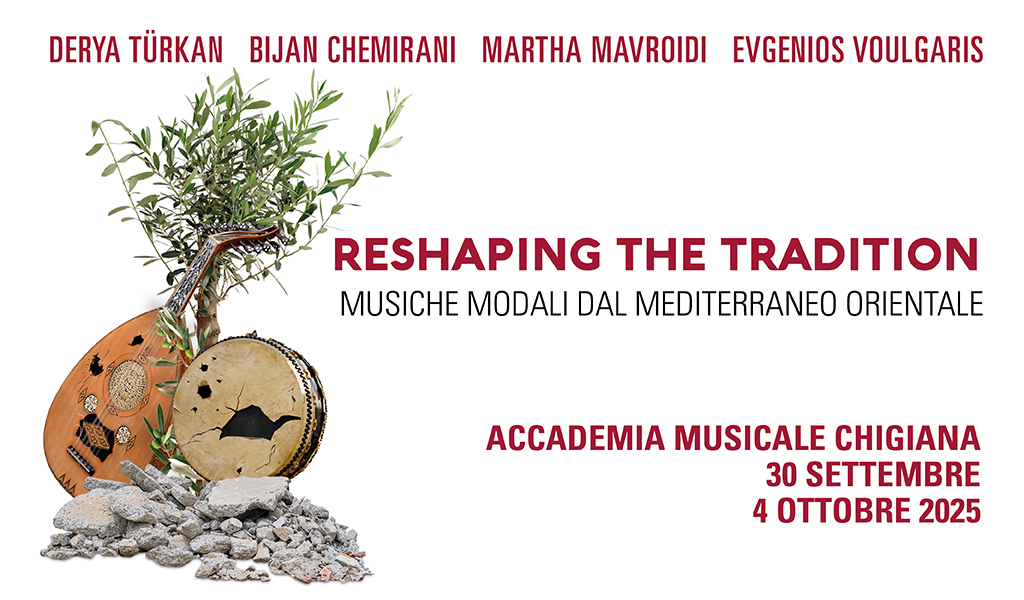
RESHAPING THE TRADITION
Traditions are increasingly invoked as a pretext to claim the legitimacy of power or to erect barriers against what is perceived as different. For this reason, it is important to remember that every human expression is born from confrontation, dialogue, and mutual translation. The challenge is not the elimination of distances, but the opportunity to explore them, to connect them, and to make them productive. This applies not only to musicians but also to their audience.
Today, even more than before, the musical dynamics brought to light by Reshaping the Tradition should offer the audience a space to reflect on the devastating violence we unfortunately still have to deal with daily.
The range of musical traditions that musicians and listeners must engage with today is not an orderly collection of memories from the past. Rather, it is a living memory, fully present, branching out in all directions and waiting to be interpreted and shared, revisited and reshaped. “Reshaping the Tradition” aims to reformulate, through musical culture, the relationship between the individual and the community, between the self and the “other,” and between one’s own context and other cultures, worlds, and traditions.
THE WORKSHOPS IN SIENA
The sixth edition of the workshop dedicated to music rooted in the Eastern Mediterranean tradition will take place from 30 September to 4 October 2025 at Palazzo Chigi Saracini, home of the Accademia Musicale Chigiana, an international centre for training, production and promotion of music. The 2025 seminars see the new participation of internationally renowned teachers such as Derya Türkan, Bijian Chemirami, Evgenios Voulgaris, together with Martha Mavroidi, already present in the last two editions.
Assistant maestro is again Ciro Montanari (tabla). Coordinator of the teaching programme is Maestro Peppe Frana.
Reshaping the Tradition is an initiative ideally linked to Labyrinth Musical Workshop, a permanent training centre founded by Ross Daly and based in Crete (Greece), whose aim has always been to overcome the distances that separate us from other cultures, left behind by a real or imaginary border to be erased.
The international project “Reshaping the Tradition”, curated by Stefano Jacoviello, is an initiative of the Accademia Musicale Chigiana with the consultancy of Labyrinth Italia, and is realised with the collaboration of Dr. Salvatore Morra and the valuable support of ISMEO – International Association for Mediterranean and Oriental Studies – whose aim is to conduct research campaigns, study programmes and advanced training on the cultures and countries of Asia and Africa, and their interaction with the Mediterranean basin.
TIMETABLE
The seminars will take place from Tuesday 30 September to Saturday 4 October in Siena, at the Accademia Musicale Chigiana, Palazzo Chigi Saracini, via di Città 89.
ADMISSIONS
To participate in the masterclasses please fill the online application form.
APPLICATION DEADLINE
15 SEPTEMBER 2025
LESSONS BEGIN
30 SEPTEMBER 2025
COURSES
FRAME DRUMS AND ZARB
BIJIAN CHEMIRAMI
THE MODAL LANGUAGE OF THE EASTERN MEDITERRANEAN REGION
EVGENIOS VOULGARIS
GREEK FOLK SINGING
MARTHA MAVROIDI
in collaboration with

workshop advisor
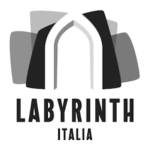
THE MUSIC OF ISTANBUL
STRINGS AND OTHER BOWED INSTRUMENTS
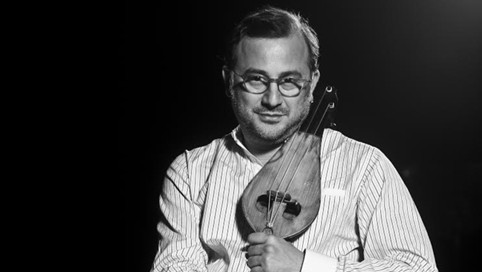
DERYA TÜRKAN
TIMETABLE
AULA ROSSINI
Tuesday, September 30th to Friday, October 3rd: h. 10:00-13:00 /15:00-18:00
Saturday, October 4th: h.10:00 – 13:00
WORKSHOP
The musical atmosphere of Istanbul can be perceived in all its facets along a broad spectrum that extends from the palace to the places where ordinary people live. The city has been a meeting point of different cultures for centuries and this has allowed new musical forms to emerge. Istanbul’s classical music has been nourished by this diversity and has acquired its own unique identity. Interactions between palace musicians and others from various regions and cultures played a decisive role.
Following the historical trajectory of the Ottoman Empire, palace music culture was of great importance especially in the 16th and 17th centuries: many outstanding composers and performers emerged during this period. However, Istanbul’s musical heritage is not only rooted in the palace, but also comes from all the places of everyday life, such as taverns and cafés in various quarters of the city. In these places, music from different cultures meets, giving rise to new styles among the people.
Especially since the end of the 19th century, Istanbul has witnessed a new phase of musical synthesis and modernisation, thanks to its relationship with the Western repertoire and musical styles.
In this workshop, focussed on strings and bowed instruments, the students will perform music composed both in the palace and among the people, from the 16th to the 20th century. Works by composers such as Ali Ufki Bey, Dimitri Cantemir, Sultan Selim III, Hanende Zaharya, Numan Ağa, Hamparsum Limoncjian and Ali Rıfat Çağatay will be performed.
ARTIST BIO
Derya Türkan is a master of the kemenche (classical Turkish three-stringed bowed instrument). He is a great connoisseur of the repertoire of classical Ottoman music, and he uses his experience as an improviser to go into other musical styles.Türkan was born in Istanbul, Turkey in 1973. He grew up in a musical family and his first music lessons were with the well-known Turkish cellist Firat Kiziltug. From 1984 to 1994, Türkan attended and graduated from the Turkish Music Conservatory Instruments Education Department of the Istanbul Technical University, where he studied kemence with Ihsan Oezgen. In 1990, he was invited to join the Turkish Cultural Ministry’s Istanbul National Turkish Music Ensemble, directed by Necdet Yasar.
In 1991 Türkan joined Turkish Radio Television (TRT), Istanbul Radio division. In 2000, he became a permanent employee of the TRT. He had the opportunity to perform alongside such master musicians as Alaeddin Yavasca, Bekir Sidki Sezgin, Niyazi Sayin, Erol Deran, Mutlu Torun, Inci Cayirli and Yavuz Ozustun. During this time, he performed at many concerts both nationally and internationally with well known groups such as the Necdet Yasar Ensemble, and Ihsan Oezgen’s Anatolia Ensemble.
Türkan has given many concerts in the United States, France, Germany, Finland, Italy, Spain, Holland, Belgium, Poland, Greece, Israel and many other countries. In particular, he performed and gave workshops both East and West coasts of the United States in universities such as MIT, Harvard and UC Santa Cruz as well as New England Conservatory.
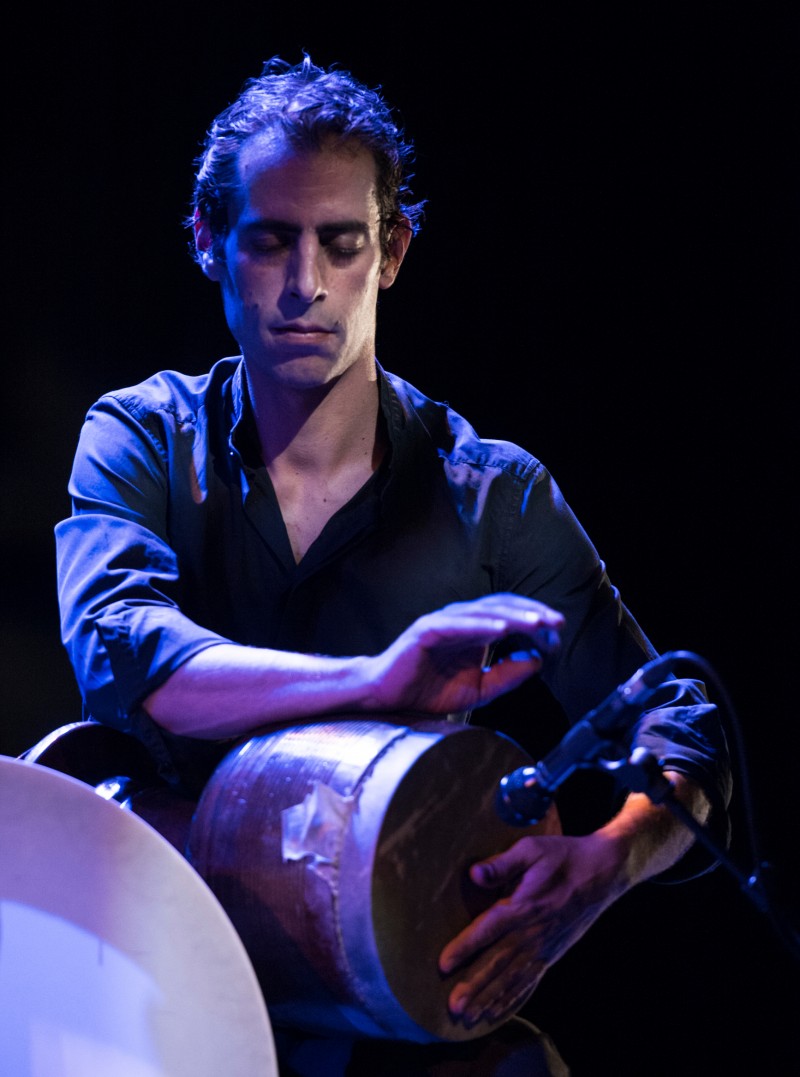
BIJIAN CHEMIRAMI
TIMETABLE
AULA TEATRINO
Tuesday, September 30th to Friday, October 3rd: h. 10:00-13:00 /15:00-18:00
Saturday, October 4th: h10:00 – 13:00
WORKSHOP
The seminar is focused on techniques and approaches to the accompaniment with percussion in various musical genres. We will work on the basic and advanced techniques on Tombak and Daf. The class will deal with composed rhythm cycles (7 beat, 9 beat, 11 beat etc.), also combining some polyrhythms and unison (2 or 3 rhythmic lines), as well as improvising and singing rhythmical patterns as a way to feel them before performing them on the drums.
ARTIST BIO
Bijan Chemirani started learning music by his father, the legendary Djamchid Chemirami, who introduced him to the rich Persian culture, Sufi poetry, classical singing and the radif repertoire (the old Persian melodies that have been passed down from master to student over many generations). Bijan turned first of all to the kamanche (a bowed string instrument), then the piano and the accordion, before returning to the zarb. He studied the zarb with his father and in Trio with his older brother, Keyvan. Then he discovered other percussion instruments, such as bendir, riqq and udu, and conceived a passion for rock, rap and the great singers of Iran.
Living in Marseille, Bijan is in close contact with the Mediterranean culture and with that of Occitania. His dexterity and his very broad palette attract artists from all backgrounds. He performs in concerts and make recordings with musicians such as Ross Daly, Dariush Talai, Ballaké Sissoko, Jean Guihen Queyras, Sylvain Luc, Sting, Socrates Sinopoulos, Serge Teyssot Gai, Renaud Garcia Fons and many others. He also learned to play the Iranian kamancheh repertoire with Cyrus Rangbar. At the age of twenty-two he recorded his first album, “Gulistan, jardin des roses”, in Athens and Marseille, with Ross Daly.
In 2007, with his sister Maryam and Greek singer Maria Simoglou, Harris Lambrakis (ney flute), Kevin Seddiki (guitar) and Pierlò Bertolino (hurdy-gurdy), he formed the group Oneira, The group’s first album, “Si La Mar“, was released in March 2009. It was followed in 2012 by “Tâle Yâd“.
As well as appearing with Oneira, Bijan Chemirani finds time to play with the Trio Chemirani, the Lopez-Petrakis-Chemirani trio, the Forabandit project, which brings him together with Sam Karpienia (former singer with the Marseille group Dupain) and the Turkish musician Ulaş Özdemir, and to work on solo recording projects.
THE MODAL LANGUAGE OF THE EASTERN MEDITERRANEAN REGION
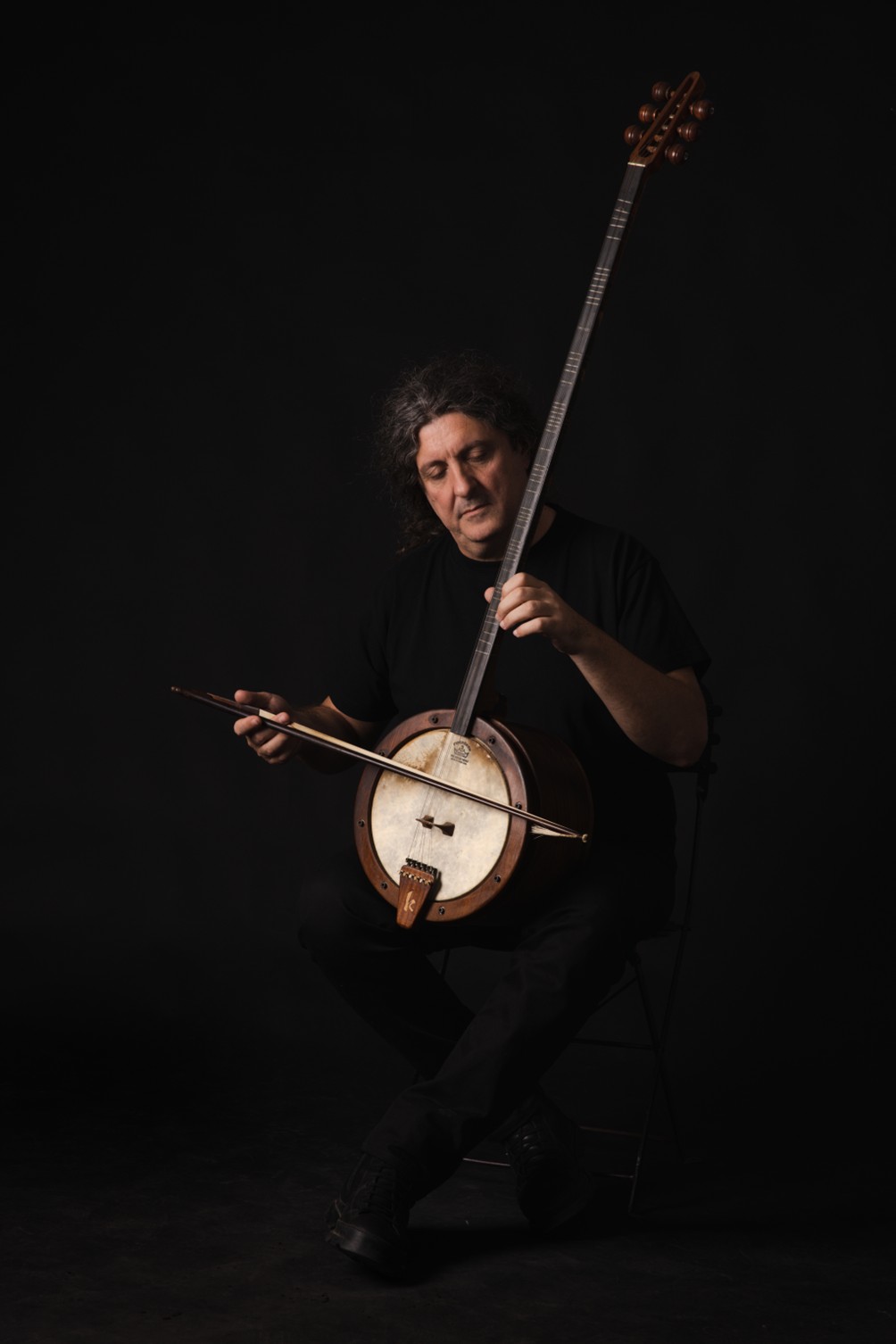
EVGENIOS VOULGARIS
TIMETABLE
AULA VERDI
Tuesday, September 30th to Friday, October 3rd: h. 10:00-13:00 /15:00-18:00
Saturday, October 4th: h10:00 – 13:00
WORKSHOP
The workshop is open to all instruments. We will explore the principles and the practice of modal melodic language through musical examples from both the traditional repertoires from the Eastern Mediterranean region and contemporary compositions, to facilitate experiential understanding.
As part of this, we will also focus on the form of improvisation.
The goal of the workshop is to help participants in developing a personal and sharp connection with the expressive power of modal melody, using it as a form of human language: that is like understanding the past while speaking in the present time.
ARTIST BIO
Eugenios Voulgaris started studying Byzantine music in 1985. Since 1992 he has been dealing with the interpretation of Eastern music styles, studying in Greece with Christos Tsiamoulis, and in Istanbul with Fahrettin Cimenli and Murat Aydemir. He also attended many Labyrinth seminars in Houdetsi, on oud, rebab, composition and orchestration.
Since 1992 he has been supervising the School of Traditional Instruments of the Diocese of Ilia in Pyrgos and Amaliada. He has been teaching at the Municipal Conservatory of Patras as the head of the Department of Greek Music. Since March 2005 he has been teaching oud, yaili tambour, organology and ensembles at Technological Educational Institute of Epirus, where he founded the Oriental Music Laboratory in the Department of Folk and Traditional Music in collaboration with Marco Skoulios, Toli Tsardaka and Pano Poulos.
He performs in Greece and abroad, participating in many recording sessions in solo, with his band Romioi, and featuring other groups and artists.
His compositional work includes music for theatrical performances and the work “The message of the prince”(together with Christos Galanopoulos). In 2006, under the auspices of the Department of Folk and Traditional Music (TEI of Epirus), a collection of 200 songs from the repertoire of rebetiko music of the interwar period was published, transcribed in the ways of oriental music (in collaboration with Vassilis Vantarakis).
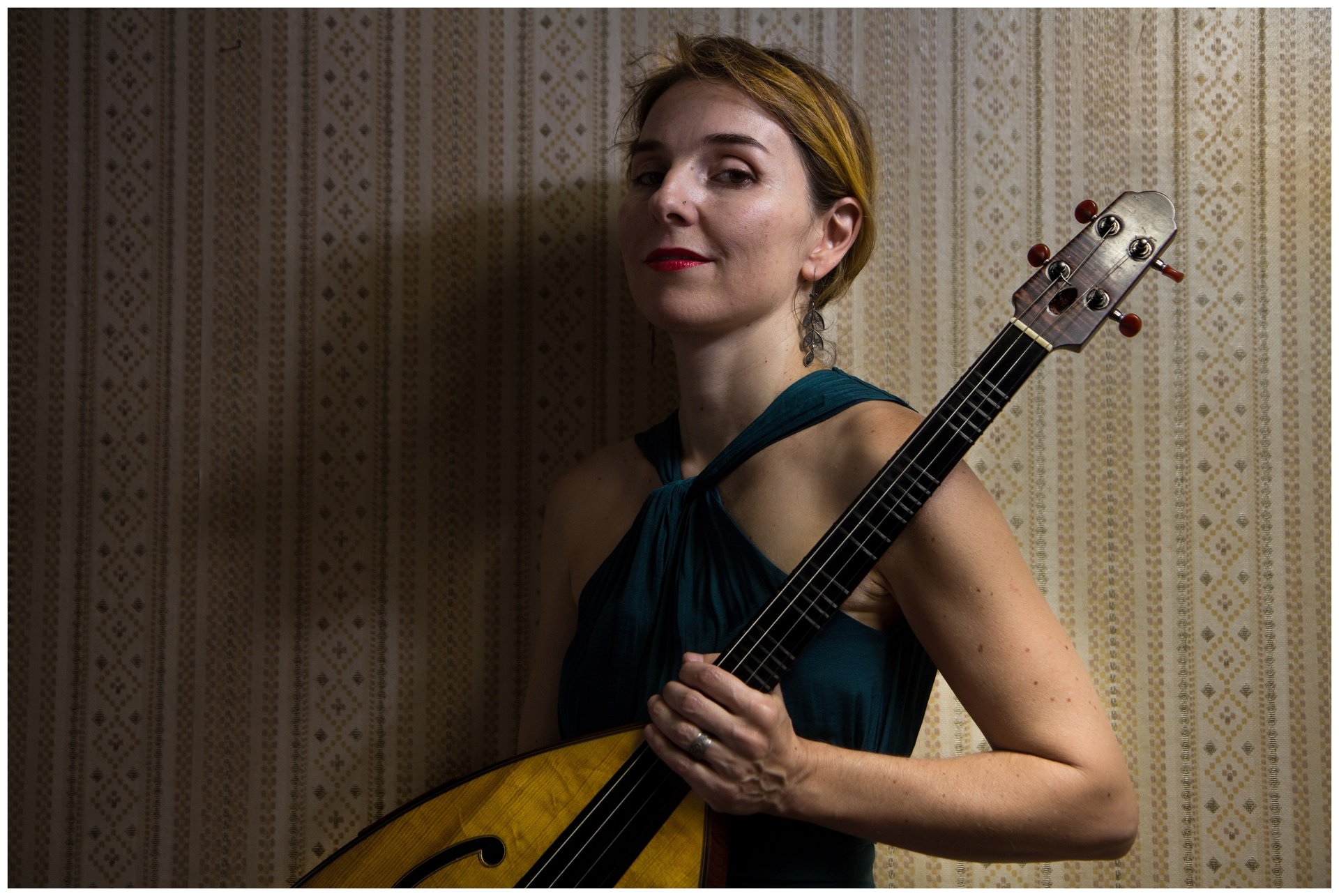
MARTHA MAVROIDI
TIMETABLE
AULA BOCCHERINI
Tuesday, September 30th: h. 15:00-18:00
Wednesday October 1st to Friday, October 3rd: h. 10:00-13:00 /15:00-18:00
Saturday, October 4th: h10:00 – 13:00
WORKSHOP
In this workshop we will learn folk songs from different parts of Greece, focusing on the stylistic details of each region: ornaments, musical intervals, rhythmic nuances. At the same time, we will consider the ethnographic context of each song, the rituals it accompanies and how they fit into the annual cycle of festivities. Studying music from different regions will give us the chance to find connections between Greek folk singing and the broader tradition of modal music in the Balkans and the eastern Mediterranean.
ARTIST BIO
Martha Mavroidi is a singer, lutist and composer from Greece. Her critically acclaimed debut album “The Garden of Rila” established her as a first class folk musician and singer of the new generation, as well as an accomplished composer and orchestrator. Martha’s extraordinary voice combines the Greek and Middle Eastern ornaments and microtonal subtleties, with the rich colors of Bulgarian singing. Her dazzling technique on the lafta and the saz, is often compared to the skills of master musicians of both folk and jazz origin.
Her second album, “Portaki”, features the Martha Mavroidi Trio, with which she has toured in Sweden, Spain, France, Turkey, Cyprus and Greece, and has performed at Womex Globalkan Scene in 2012. Constantly working on new projects, performing also with her acoustic quartet and different music ensembles, she composes music for films and dance show. Martha Mavroidi is the artistic director of Tinos World Music Festival.

